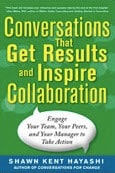One radical idea that will transform workplace interactions
I’m delighted to welcome back Shawn Kent Hayashi of The Professional Development Group, who last wrote an article for us back in 2010. This time she’s sharing some great ideas about making the most of criticism at work.
There’s one radical idea that will transform workplace interactions.
Here it is:
Criticism is a form of collaboration.
Let’s face it, criticism is at the heart of conflict, and conflict is a problem that many of us don’t want to face for a variety of reasons. Some people have personalities that are conflict-averse, and so they refrain from giving feedback that could be essential in moving the team forward. Others who are less fearful of conflict might react so boisterously and negatively to criticism that colleagues and direct reports are bullied into silence.
Criticism can be a problem in the workplace. But it doesn’t have to be. In fact, it is vital to any company’s success. The ability to deliver criticism effectively and listen to it carefully are the hallmarks of superior leadership. Why? We all have blind spots. Criticism helps us correct behaviours that would otherwise stand in the way of achievement.
Criticism helps you get to the better idea faster
Take Craig, for example. Craig was an effective manager, but a terrible presenter. His presentations overwhelmed people with unnecessary detail, lacked focus, and were generally too long. He also rarely practiced his talks, so he tended to ramble. Craig’s boss knew that if she didn’t sit Craig down to discuss his poor presenting skills, he would never advance in his career.
Viewing herself as a collaborator in Craig’s professional development made it easier for his boss to provide the negative feedback he needed to hear.
Seeing his boss as a collaborator in his professional development helped Craig to value the feedback and act on it.
Anyone involved in innovation also understands the value of criticism: it helps you get to the better idea faster.
Cathy and Derek work at a pharmaceutical start-up under pressure to deliver results within 6 months to a year. Both researchers know that criticizing strategy, experiments, and data vigorously on a daily basis ensures the best thinking, and the best thinking is what will help the company move forward faster.

Shawn Kent Hayashi is the business conversation expert who helps executives solve problems within organizations, teams, and work groups. In her new book, Conversations that Get Results and Inspire Collaborations, Hayashi shares her expertise on communication, group dynamics, and
